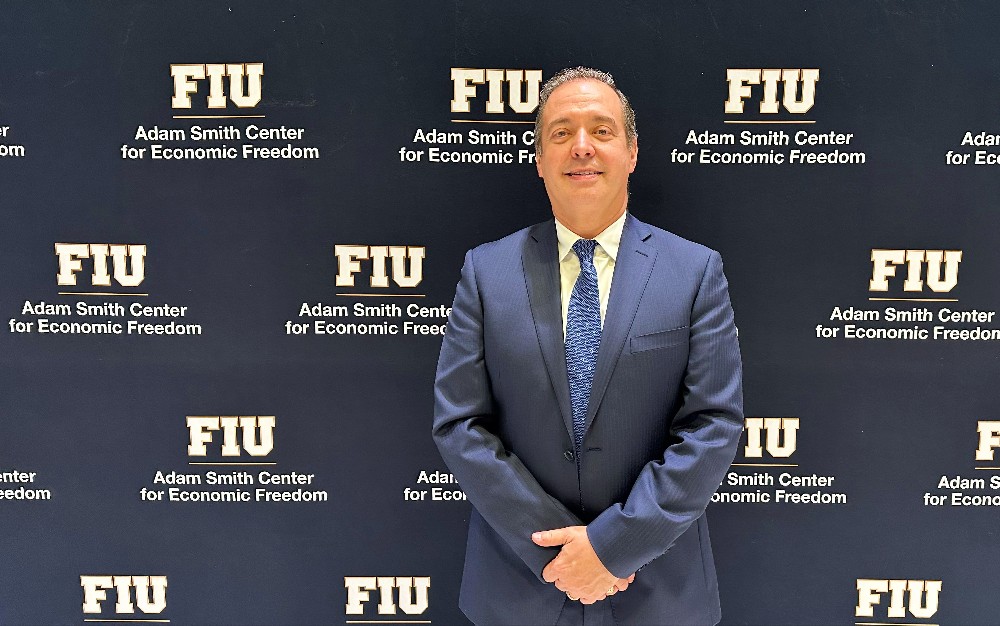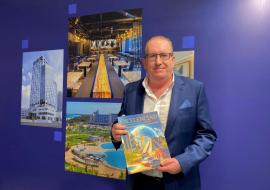Americas Tourism Summit 2024: A Conversation with Carlos Rosillo

By Verónica de Santiago
As part of the first Americas Tourism Summit, organized by the Adam Smith Center for Economic Freedom at Florida International University, Caribbean News Digital spoke with Carlos Rosillo, director and founder of this prestigious institution.
This inaugural event brings together government leaders, businesspeople, and tourism experts with a clear goal: to position tourism as a key driver of economic development and economic freedom in the region.
Rosillo shares the pillars that shaped the summit's program, highlighting the inclusion of crucial topics such as public-private partnerships, artificial intelligence applied to tourism, and sustainability. Additionally, he emphasizes the importance of regional collaboration and Miami’s role, not only as a tourism hub but also as a strategic business center. This event is not just a summit; it marks the beginning of a continuous effort to generate real impact on tourism and the economy of the Americas.
How did the idea for this event come about?
The idea emerged some time ago as a way to send a clear message that tourism can be a significant source of economic development. And, of course, since the center is in Miami, we believe Miami should be the leader in this sector for the Americas.
The idea is to bring together ministers, decision-makers, and the most important businesspeople in the tourism sector so they can exchange ideas and turn tourism into a true source of economic development and economic freedom because tourism cannot exist without economic freedom.
What considerations were made in creating and designing the scientific program?
We tried to include important topics specifically to make tourism a source of development. Topics like public-private partnerships, the role of artificial intelligence, urban tourism, and how to design serious, innovative, and sustainable public policies.
We aimed to choose relevant themes for this sector, and since it’s the first time, many topics were naturally left out. But the idea is to hold this event annually, so it becomes stronger, more impactful, and brings more and more people together.
Is the goal for Miami to become not only a hub for aviation and airports in the Americas but also a hub for conferences?
Absolutely, to be the hub… I don’t know the exact word in English, conveners. To use our convening power, given our geographic location, to host important events. This one is about tourism, but we also organize business events, political events, and events on various topics throughout the year.

When selecting speakers, how important was it to consider the different countries, personalities, or professionals from each field?
Regarding the ministers, we invited all the ministers from Ibero-America. For the speakers, we focused less on where they come from and more on their areas of expertise and what they can contribute to the topic. So, while all ministers were invited, speakers were selected based on their experience and knowledge rather than their region.
The event also has the support of Florida as a state. The Lieutenant Governor participated this morning.
That’s correct. One of the fundamental points she highlighted was education and training.
What is the Adam Smith Center doing in terms of training as a destination?
One of the center's main objectives is to train the next generation and inspire future leaders to become public servants and, when they do, to promote serious, responsible, pro-free-market, and pro-democracy public policies. This is a fundamental part of the center, and all the events we organize always prioritize students, inspiring them and giving them the opportunity to meet important decision-makers so they know they too can achieve these roles in the future.
You talk about inspiration. This morning’s sessions and the ongoing ones this afternoon have been inspiring. Aviation continues to be a cornerstone for Miami. We’ve seen this. It’s not just a hub; it’s also a job generator and a driver of tourism development.
Absolutely. What we’ve noticed is that many ministers are particularly interested in aviation because they want their countries to achieve the connectivity they need to develop their tourism sectors significantly.
Miami is already a hub for communication, transportation, and aviation. Without a doubt, this makes it easier for people from different parts of the world to come to Miami, not just to enjoy its tourist attractions but also to conduct business here.
Many ministers have expressed their desire for their countries to improve connectivity. In some cases, there are no direct flights between Miami and certain capitals, and they are seeking to establish this connectivity—not only for tourism, which is important, but also to attract investors. It’s challenging for investors to consider a country where connectivity is complicated.
What is this summit aiming for? What’s its main goal? Looking ahead to the second year, I mean next year, what elements will be considered? What’s the ultimate objective?
We want to use our convening power to attract decision-makers and the most important businesspeople in the tourism sector to engage in meaningful dialogue, promoting public policies that support tourism not just as an industry but as a source of economic growth and development.
The idea is to start important conversations with these decision-makers and businesspeople that extend beyond the summit. We don’t want it to stop here; we want them to exchange ideas and maintain contact, so that in the next edition, they can report back on the progress and achievements resulting from these connections.
Could we say that this summit is a turning point for regional cooperation?
I hope so. I hope it becomes that. There’s a lot of talk about regional cooperation, and many events touch on the topic, but the idea is to follow through, ensuring it doesn’t end with interesting conversations but leads to concrete actions that take advantage of this opportunity.
It’s not every day that ministers can meet with important businesspeople, nor is it every day that we can highlight tourism as an example of growth and economic development in a city like Miami. Miami is a real example of how tourism can drive growth, becoming not just a tourism hub but also a financial and strategic hub for the United States and Latin America.
Will there be a manifesto or document as a roadmap for different countries before the next edition?
Not for this summit. The idea is not to produce a document since those usually require lengthy pre-negotiations. The objective of this first summit is to bring decision-makers and businesspeople together and start the dialogue.
Perhaps for future editions, we can consider a document, but for now, this is just the beginning. It’s a starting point to unite ideas and generate proposals that, with proper follow-up, can translate into concrete actions.














